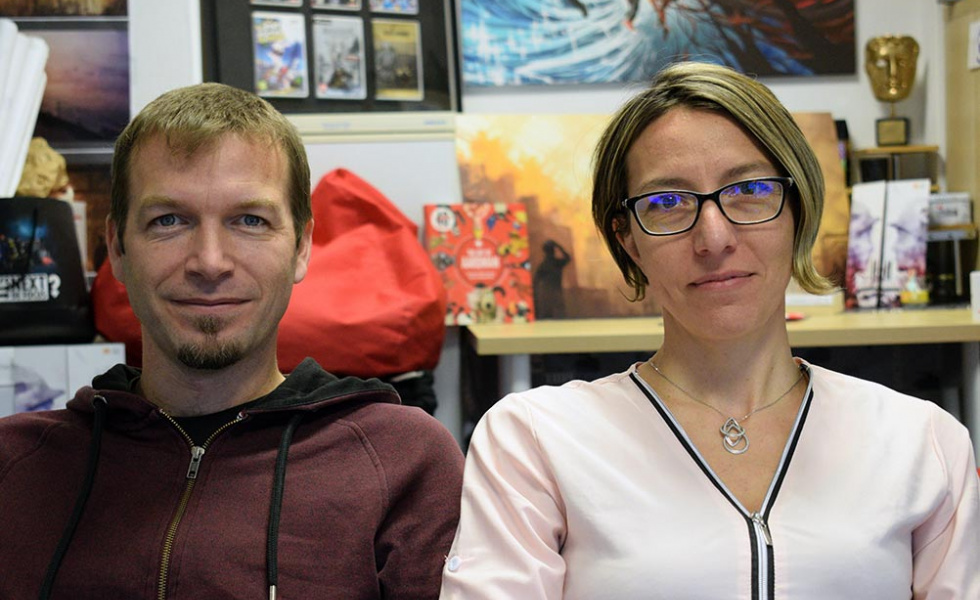The art of leading players to the other side of the mirror is one thing. But this time, the Montpellier studio is taking them out on the road.
DigixArt Entertainment revealed its new video game in December at
Game Awards 2020, the third in its catalog:
Road 96, a long road trip.
Players must escape from Petria, a fictional country on the verge of collapse. To succeed, they must take the legendary Route 96 in hopes of reaching the border. Of course, the journey during the road trip is more important than the destination. Featuring game play enriched with artificial intelligence, Road 96 is a continuation of the studio’s previous games, notably offering content that is filled with emotion and a humanistic touch.
Founded in 2015, DigixArt has its own clearly identifiable signature, which it imposed quickly in the video game world. Its first creation,
Lost in Harmony, is an odyssey that tells the tale of two teenagers caught up in a moving story. The next game,
11-11 Memories Retold, takes place during World War I. DigixArt always wants to make it more than just a game.
“With 11-11 Memories Retold, we wanted to talk about the war from a different angle, placing players in the shoes of a Canadian or German soldier, enabling them to live the experience from their own points of view, without any biased vision regarding the conflict. They see firsthand how the human experience and pain are similar on both sides,” explains Yoan Fanise, creative director and co-founder of DigixArt Entertainment, with his wife Anne-Laure.
That is how the Montpellier studio, hosted at the
Montpellier BIC startup incubator, contributes meaningfully to social impact games, which are games designed to make people think. When 11-11 Memories Retold was launched, the British site
Metro GameCentral commented in its review that the video game was able to take on serious topics with respect and a level of insight that only interactivity could provide.
However, DigixArt’s uniqueness is not limited to its narrative approach. The studio also has a clearly identifiable graphic feel. 11-11 Memories Retold is the first video game painted in 3D, a result obtained by developing an innovative rendering technique. Distributed by the Japanese publisher
Bandai Namco, the game united the studio’s Montpellier teams with those of the English studio
Aardman Animations, creator of Wallace and Gromit. The effort involved a total of 40 people over three years. Two actors lent their voices to the main characters in the game:
Elijah Wood (Frodo Baggins in the Lord of the Rings) and German television and film actor
Sebastian Koch. The music was handled by the London Symphony Orchestra, which recorded at Abbey Road Studios. The game was launched on November 9, 2018, translated into 17 languages and ported to PC, PS4, and Xbox platforms.
The studio’s drive for perfection helped confirm DigixArt Entertainment’s presence in the video game landscape. In 2018, it was
the only independent French studio selected at the Tokyo Game Show. Its games have been nominated and awarded several times, notably for Lost in Harmony at the Indie Prize Awards, and for 11-11 Memories Retold at the Game Awards and by the
British Academy of Film and Television Art (BAFTA).
Yoan Fanise was no stranger to the video game world before founding DigixArt. He had spent fifteen years at Ubisoft, first in Montpellier and then in Singapore. During those years with the video game giant, he contributed to popular productions such as Beyond Good & Evil, King Kong, Raving Rabbits, and Assassin’s Creed. He was then the content leader for Valiant Hearts - the Great War. That work swept the awards for Best Narrative and Games for Change at the Video Game Awards event in Las Vegas.
When he came back to France, Yoan Fanise decided to create his own studio in order to “stop being a cog in a big machine and focus on the viability of an artisan style organization.” At that time, he met Montpellier Méditerranée Métropole teams at the IDATE
DigiWorld Summit. “We can help you,” they told him. “Along with assistance from Regional authorities, that support was decisive, providing advice, networking, help seeking funding, and elaborating a 5-year business plan,” he recognizes today.
Since then, Yoan Fanise has played a central role as
an ambassador for the CCI (creative and cultural industries) ecosystem in the Montpellier Métropole area, whose benefits he promotes:
“We are fortunate that Montpellier has experienced talents and high-level schools – universities, Esma, ArtFX – that stimulate creativity. Public support initiatives, such as the Creative City, complement those activities,” he highlights.



